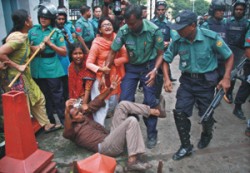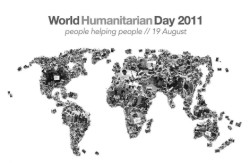Human Rights Monitor
Make law enforcers accountable
 Continuing police torture and extrajudicial killings in Bangladesh need to be stamped out, say rights activists, officials and citizens. Chairman of the National Human Rights Commission of Bangladesh Mizanur Rahman told IRIN a lack of accountability within the law enforcement system is to blame for persistent evidence of torture seen by the commission. “Torture in police custody and extrajudicial killings by law enforcers in Bangladesh is one of our top priority concerns and areas of intervention,” Rahman said. “This must be stopped.”
Continuing police torture and extrajudicial killings in Bangladesh need to be stamped out, say rights activists, officials and citizens. Chairman of the National Human Rights Commission of Bangladesh Mizanur Rahman told IRIN a lack of accountability within the law enforcement system is to blame for persistent evidence of torture seen by the commission. “Torture in police custody and extrajudicial killings by law enforcers in Bangladesh is one of our top priority concerns and areas of intervention,” Rahman said. “This must be stopped.”
Odhikar, a local human rights organization, said at least 10 people had been tortured to death by law enforcement agencies in the first six months of 2011. It documented 67 torture cases in 2010, which led to 22 people reportedly dying. There were 68 cases of reported torture in custody in 2009. “There is a growing sense of impunity felt by law enforcement officials with regard to torture, and this must stop now or it's going to get worse here," said Adilur Rahman Khan, secretary of Odhikar. “Most of the victims of torture do not report it out of fear; therefore, whatever data we have is just the tip of the iceberg."
Extrajudicial killings have been documented by New York-based Human Rights Watch (HRW), which, in May 2011, said that since 2009 nearly 200 people had allegedly been killed by the Rapid Action Battalion (RAB), an elite law-enforcement agency. “No RAB officer has ever been prosecuted for any of the killings carried out by the force,” said the HRW report.
In March 2011, RAB was publicly criticized for shooting college student Limon Hossain in Jhalakathi District, southern Bangladesh. Though defence adviser to the prime minister retired Maj-Gen Tarique Ahmed Siddique and Home Minister Sahara Khatun defended RAB, the agency accused Hossain and his family of having criminal connections. Hossain was eventually freed, after the media and rights activists drew attention to the case and his believed innocence. "Our law enforcers need to train up on human rights to stop torture and extrajudicial killings," said Sultana Kamal, a former adviser to the caretaker government and head of Ain o Shalish Kendra, a legal aid and human rights organization and chairman of Transparency International Bangladesh. To achieve this goal, “the government's political will is critical,” she said.
Secretary of the Ministry of Home Affairs Abdus Sobhan Sidker told IRIN: “The government of Bangladesh does not accept the usage of torture or extrajudicial killing and will do everything in its power to stop it.” Abdul Kadar, a Dhaka University student, told IRIN he was recently tortured and arrested on trumped-up charges on his way home from his sister's house. He said police beat him and used sticks and sharp objects to make him confess to crimes he did not commit. He was charged with possessing lethal weapons, robbery and carjacking, then put in jail. Following campaigns by the media and rights activists, the high court ordered him to be released on 3 August after 18 days in detention. One of the officers involved has been suspended.
“I was not served water while I was crying out in pain and I was not taken to hospital even 18 hours after my arrest,” Kadar said. As a signatory of the UN Convention against Torture, Bangladesh's government takes a hard line on torture on paper, but each year there are more stories like Kadar's, or worse.
Source:IRIN.
World Humanitarian Day
Tanzim Alam
 "Humanitarian work and human rights are inextricably intertwined. It is very often abuse of human rights that causes humanitarian crises in the first place. And without humanitarian aid, the basic human rights of millions of people including the right to seek asylum from persecution, the right to education, and, most fundamental of all, the right to life would be denied"( Navi Pillay : High Commissioner for Human Rights of UN). The United Nations' (UN) World Humanitarian Day is commemorated on August 19 each year. The day is a tribute to all humanitarians who have worked in the promotion of the humanitarian cause, and those who have sacrificed their lives in the cause of duty. Enhancing public awareness about humanitarian activities worldwide and the significance of international cooperation is the ultimate aim of observing this day.
"Humanitarian work and human rights are inextricably intertwined. It is very often abuse of human rights that causes humanitarian crises in the first place. And without humanitarian aid, the basic human rights of millions of people including the right to seek asylum from persecution, the right to education, and, most fundamental of all, the right to life would be denied"( Navi Pillay : High Commissioner for Human Rights of UN). The United Nations' (UN) World Humanitarian Day is commemorated on August 19 each year. The day is a tribute to all humanitarians who have worked in the promotion of the humanitarian cause, and those who have sacrificed their lives in the cause of duty. Enhancing public awareness about humanitarian activities worldwide and the significance of international cooperation is the ultimate aim of observing this day.
Humanitarians render life-saving aid to millions of people through the world. They put their own lives in peril to assist others in the conflicting regions and naturally hazard areas. Humanitarians provide support for different world crises such as hunger, gender-based violence, refugees and displaced people, help for children, as well as clean water and access to sanitation. While trying to assist the needy people in those areas more than 700 humanitarian workers have died or faced the most dangerous situations. World Humanitarian Day was established by the General Assembly of the UN in December 2008 and was first observed in August 2009. The date of August 19 is the anniversary date of the 2003 Canal Hotel bombing in Baghdad where twenty-two people lost their lives including, the UN's High Commissioner for Human Rights and the Special Representative of the Secretary-General to Iraq, Sergio Vieira de Mello.
The General Assembly decided to mark the anniversary date of the bombing as World Humanitarian Day. The World Humanitarian Day as a homage to all humanitarian workers who have made the ultimate sacrifices to make the world a better place for all sufferers of humanitarian crises and an encouragement to all their serving colleagues to aspire to even greater heights in achieving that impressive goal. Humanitarian activities stem from the adoption in the 19th century of codes of conduct during armed conflicts. States were agreed to create balance between humanitarian concern and States' military exigencies in modern warfare perspective.
The Geneva Conventions at the origins of International Humanitarian Law seek to officially protect mass who do not actively participate in the conflict. After sixty years, the Conventions are almost universally ratified. In the 21st century, humanitarian work is no longer limited to the protection and provision of emergency aids and relief to civilians whose lives were hampered during armed conflict. Natural calamities or man-made crises can also be the cause of vulnerability. Various global economic and financial crises like food crises, massive displacement of populations, crises for safe water are some miserable picture of current world which increase the need for humanitarians each year.
The writer is a student of University of Rajshahi.